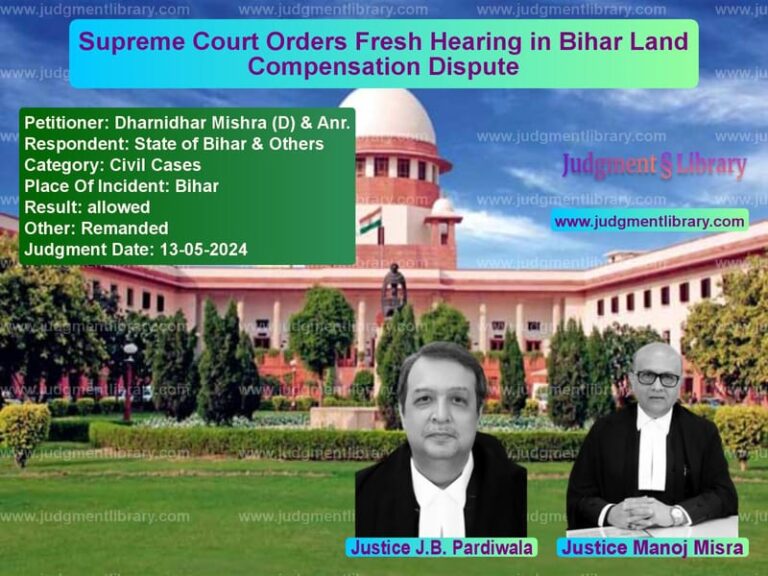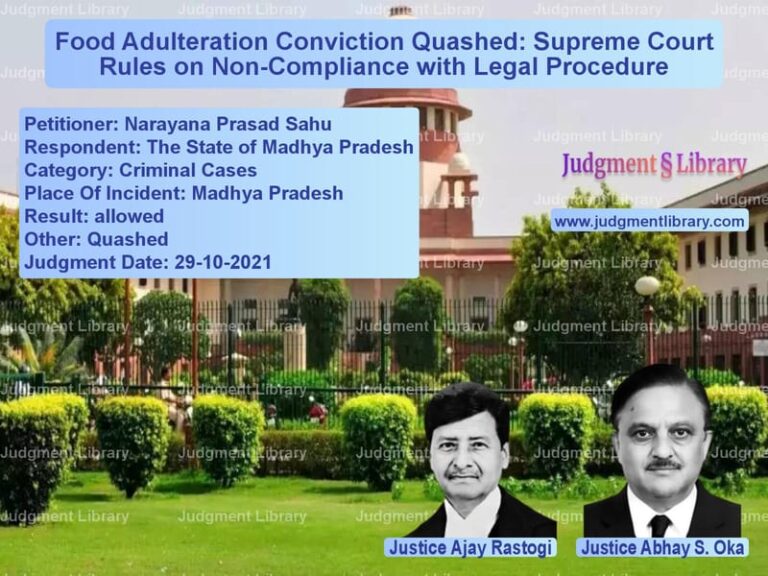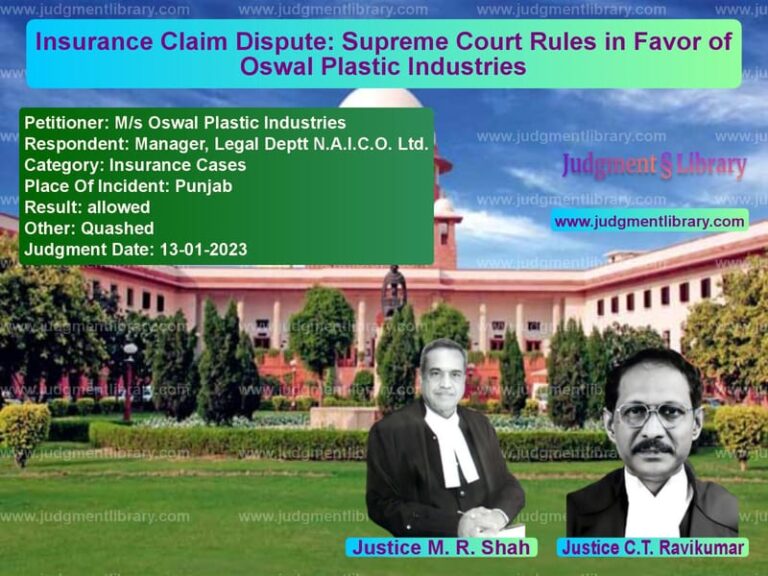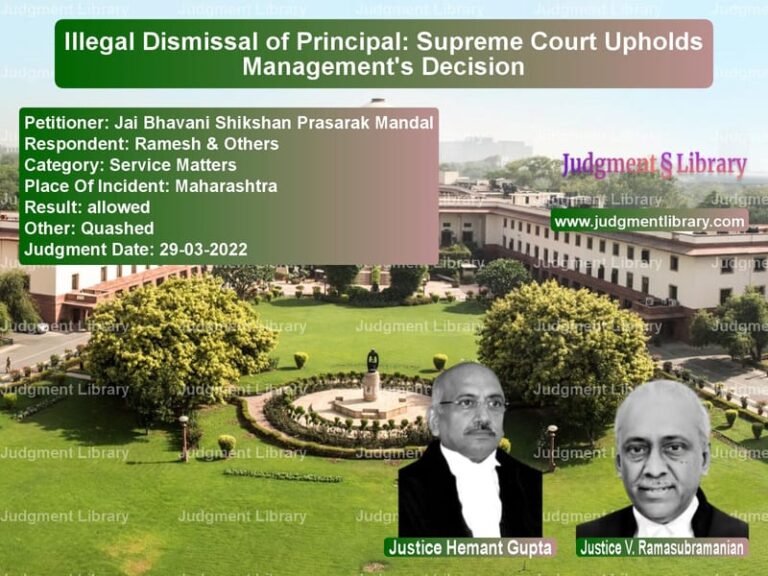Tenant Eviction Dispute: Supreme Court Ruling on Lease Violations and Property Rights
The case of Yuvraj @ Munna Pralhad Jagdale & Ors. vs. Janardan Subajirao Wide revolved around a long-standing property dispute concerning a leased commercial property. The legal battle commenced from the judgment of the Bombay High Court, which overturned an eviction order issued by lower courts. The Supreme Court revisited the case, scrutinizing whether the tenant had unlawfully assigned his leasehold rights, which would warrant eviction under the Bombay Rents, Hotel, and Lodging House Rates (Control) Act, 1947.
Background of the Case
The original lease agreement for the premises located in Bhamburda, Pune, was signed between the predecessors-in-title of the appellants (landlords) and the respondent (tenant), allowing the tenant to operate a hotel business. The landlords sought eviction on two primary grounds:
- The tenant had made unauthorized structural modifications (construction of a toilet) in violation of Section 13(1)(b) of the Bombay Rent Act.
- The tenant had unlawfully assigned his interest in the leased property to a third party (Krishna B. Shetty), thereby violating Section 13(1)(e) of the Act.
Decisions by Lower Courts
The trial court ruled in favor of the landlords, citing evidence that the tenant had executed an assignment agreement with Krishna B. Shetty, effectively transferring his business interests. The appellate court upheld this ruling. However, the Bombay High Court overturned these decisions, stating that mere execution of a partnership agreement with a third party does not constitute unlawful subletting.
Key Arguments Before the Supreme Court
Petitioners’ Arguments
- The lease agreement explicitly prohibited any form of assignment or subletting.
- The tenant signed an assignment agreement on January 15, 1985, transferring his business for ₹2,00,000, with ₹50,000 received as earnest money.
- Execution of this agreement itself amounted to a breach of lease terms, regardless of whether the transfer was successfully completed.
- The tenant had vacated the premises in favor of Krishna B. Shetty, who ran the hotel business independently.
Respondent’s Arguments
- The partnership agreement with Krishna B. Shetty was a legitimate business decision and did not constitute an unlawful sublease.
- The tenant never completely parted with possession of the premises.
- The failure of Krishna B. Shetty’s subsequent legal suit for specific performance against the tenant indicated that no unlawful transfer had taken place.
Supreme Court’s Observations
The Supreme Court carefully examined the lease agreement, statutory provisions, and evidence from the trial. It found that:
- The lease agreement explicitly forbade assignment or transfer of business to a third party.
- The tenant had signed an assignment agreement, accepting money in exchange for transferring his leasehold rights.
- The High Court’s reliance on Section 15 of the Bombay Rent Act, which allows assignment in some cases, was misplaced, as no official notification permitting such a transfer existed.
- The execution of the assignment agreement was in itself a breach of contract, and any subsequent events (such as the failed specific performance suit) had no bearing on the issue.
Final Verdict
The Supreme Court set aside the Bombay High Court’s ruling and reinstated the trial court’s eviction decree. It ordered the legal heirs of the deceased tenant to vacate the premises within two months, failing which the landlords were entitled to initiate execution proceedings.
Legal Precedents and Implications
This case underscores the importance of adherence to lease agreements and statutory tenant protection laws. The ruling clarified that:
- Any assignment or transfer of tenancy rights, even if done through a partnership agreement, must conform to statutory provisions and lease terms.
- The execution of an assignment agreement, accompanied by financial consideration, constitutes a completed breach, making subsequent events irrelevant.
- Courts should scrutinize business arrangements to determine if they are genuine partnerships or mere disguises for unlawful subletting.
The ruling reaffirms the rights of landlords to reclaim possession in cases of unauthorized assignment, reinforcing the principle that lease terms must be strictly upheld.
Petitioner Name: Yuvraj @ Munna Pralhad Jagdale & Ors..Respondent Name: Janardan Subajirao Wide.Judgment By: Justice Sanjay Kumar, Justice Sudhanshu Dhulia.Place Of Incident: Bhamburda, Pune.Judgment Date: 21-03-2023.
Don’t miss out on the full details! Download the complete judgment in PDF format below and gain valuable insights instantly!
Download Judgment: yuvraj-@-munna-pralh-vs-janardan-subajirao-w-supreme-court-of-india-judgment-dated-21-03-2023.pdf
Directly Download Judgment: Directly download this Judgment
See all petitions in Property Disputes
See all petitions in Specific Performance
See all petitions in Landlord-Tenant Disputes
See all petitions in Contract Disputes
See all petitions in Judgment by Sanjay Kumar
See all petitions in Judgment by Sudhanshu Dhulia
See all petitions in allowed
See all petitions in supreme court of India judgments March 2023
See all petitions in 2023 judgments
See all posts in Civil Cases Category
See all allowed petitions in Civil Cases Category
See all Dismissed petitions in Civil Cases Category
See all partially allowed petitions in Civil Cases Category







